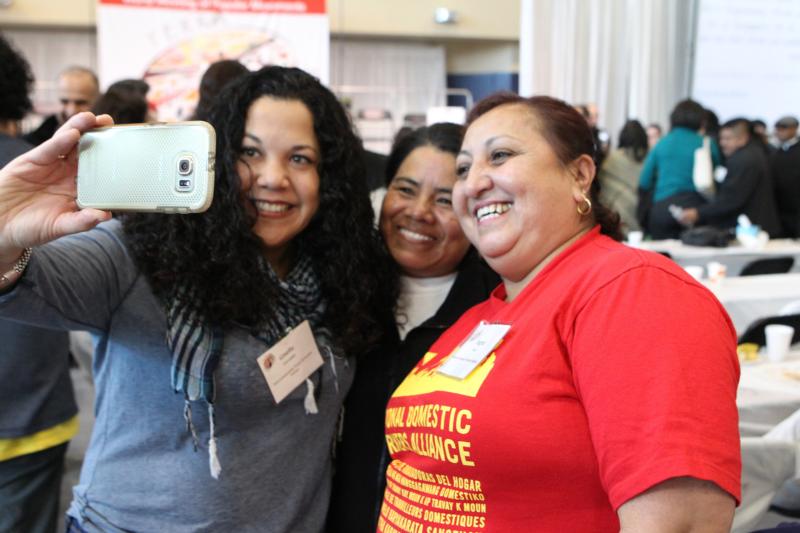
Ingrid Vaca of Dreamers Moms USA International, right, poses for a selfie with friends during a break at the U.S. Regional World Meeting of Popular Movements Feb. 18 in Modesto, Calif. It is in friendship that we can imitate Jesus’ model for evangelization in ordinary life. (CNS photo/Dennis Sadowski)
Recently, I had an encounter with a fellow traveler at a restaurant. We made small talk for a few minutes and then started to talk about family life. Before I knew it, I was sharing about my faith in Christ and asking him about how he has seen God working in his own life.
It is amazing what happens when we are open to the promptings of the Holy Spirit. The Catechism of the Catholic Church states, “God, infinitely perfect and blessed in himself, in a plan of sheer goodness freely created man to make him share in his own blessed life. For this reason, at every time and in every place, God draws close to man” (No. 1).
God always is close by and at work in our conversations with others.
[hotblock]
French writer and Catholic convert Leon Bloy wrote, “The only real sadness, the only real failure, the only great tragedy in life, is not to become a saint.” We live in a time where the world needs saints more than ever — and not just any saints, but saints that live in the midst of ordinary life.
The catechism speaks of our common vocation in baptism as a “vocation to holiness and to the mission of evangelizing the world” (No. 1533). But how do we do this in the midst of our ordinary lives?
First, we must look to Jesus. Jesus did speak to the masses and gave great speeches, but mostly he invested his life deeply in 12 men. Jesus told the apostles, “I no longer call you slaves. … I have called you friends” (Jn 15:15). It is in friendship that we can imitate Jesus’ model for evangelization in ordinary life.
Father C. John McCloskey wrote, “Friendship, for a Christian, can be an effective form of evangelization. … Throughout the history of the church, starting with our Lord himself, Christianity has spread principally throughout one-on-one encounters.”
Friendship fosters a natural encounter with other people and space for the Holy Spirit to work in the hearts of others. Our ordinary circumstances allow for these opportunities of authentic witness.
In his recent book, “Strangers in a Strange Land,” Archbishop Charles J. Chaput of Philadelphia comments on this fact: “The most powerful kind of witness doesn’t come from a classroom or pulpit. It doesn’t need an academic degree or special techniques. Instead, it grows naturally out of the lives of ordinary people — parents and spouses and friends; people confident in the love that God bears for them and eager to share it with others.”
We are called to live in the world and to witness to the saving power of Jesus Christ and his church.
As we build friendships with others, we should not only look to their spiritual needs, but their temporal needs as well. In his book, “Jesus as Friend,” Salvatore Canals writes, “Before wanting to make saints out of all of those people we love, we have to make them happy and joyful, for nothing better prepares the soul for grace than joy.”
We must be people who live like thermostats, not thermometers. A thermometer measures the temperature in a room, but a thermostat impacts the temperature of its environment. As Pope Francis says, “An evangelizer must never look like someone who has just come back from a funeral!”
[hotblock2]
We are called to live the “joy of the Gospel” and proclaim it “whether it is convenient or inconvenient” (2 Tm 4:2). And from this joy, we look for ways to serve those around us.
Pope Benedict XVI comments on this in his encyclical “Deus Caritas Est” (“God is Love”): “No longer is it a question, then, of a ‘commandment’ imposed from without and calling for the impossible, but rather of a freely-bestowed experience of love from within, a love which by its very nature must then be shared with others. Love grows through love.”
Finally, at the foundation of our evangelization efforts is prayer, particularly prayer for other people. Pope Francis says, “One form of prayer moves us particularly to take up the task of evangelization and to seek the good of others: It is the prayer of intercession.”
In order to bring people to the heart of Jesus, we must develop a heart for them in prayer. I would recommend the advice of Father Leo Trese in his book “The Faith Explained”: “There are so many to pray for. … A practical suggestion is to write down on a card or a sheet of paper a list of all the people for whom we wish to pray and cast a quick eye over it each morning at the time of our morning prayers.”
By this simple practice, we will see the Holy Spirit open doors for us in our daily interactions with others.
God is calling each of us ordinary Catholics to be evangelizers in our daily lives. Each of us has the chance to bring Christ to others. This is our vocation, our way of being saints in the modern world.
***
Stanley is the director of apostolic development at The Fellowship of Catholic University Students. He writes at www.practicalcatholicismblog.com.
PREVIOUS: Anyone can evangelize — here’s how
NEXT: Evangelization: A daunting, but surprisingly simple, task



Share this story